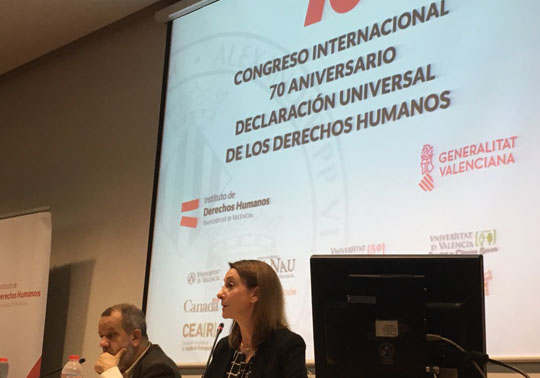The Ombudsman condemned the cost of the cutback policies for Human Rights
- Institute of Human Rights
- December 12nd, 2018

The Ombudsman, Francisco Fernández Marugán, condemned “the important social cost” that was caused during 2008 and 2014 due to the cutback policies. Fernández Marugán gave a talk on the occasion of the 70th anniversary of the Universal Declaration of Human Rights at a conference organised by the Institute of Human Rights of the Universitat de València.
According to the Ombudsman, “the cutbacks that were conducted to public policies reduced the welfare of the most vulnerable citizens. Later, no efforts were made to balance the welfare state to its previous spending levels. Therefore, the global balance is still negative”, he assured. Fernández Marugán explained that the Spanish public administrations have limited expenditure in education, healthcare, social housing and services, and assistance to poor families. “If we want to reduce inequalities, we will have to spend more on these types of policies”, he added.
Fernández Marugán pointed out that the progress made in terms of Human Rights 70 years after the Universal Declaration of Human Rights are “significant”. Nonetheless, he denoted that “there are still numerous violations of rights in many parts of the world”. He defended a joint, coordinated and caring intervention of the States as it is the only way of dealing with the great human challenges.
He also indicated that it should be considered to widen the Ombudsman’s administrative supervision not only to the traditional public administration, but also to the private companies that provide outsourced services.
After the Ombudsman’s speech, there was a panel of discussion entitled “Informar sobre los Derechos Humanos”. It counted on the collaboration of RNE correspondent in Jerusalem, Cristina Sánchez; the Europa Press editor, Isabel Vega; and the photojournalists Gervasio Sánchez and Javier Bauluz. The debate was moderated by the Cadena Ser journalist Nicolás Castellano. Cristina Sánchez defended the necessity of reporting specific stories because one of the main communicative problems is that they are lost in the multitude. Gervasio Sánchez was very critique with the media because there are no longer interested in humanitarian tragedies. Javier Bauluz has just returned from Tijuana. He confirmed Gervasio Sánchez’s opinion and reported how the migrant problem in the United States border has suddenly disappeared from the media, although they have been attacked with tear gas from the northern side of the border. Isabel Vega lamented the prominent reduction of tolerance in issues such as the Melilla border fence and the pushbacks.
There is also a panel of discussion on the role of NGOs supporting human rights, moderated by the professor Rosario Serra and counting on the collaboration of Mila Font (MSF), Estrella Galán (CEAR), Manuel Blanco (ProEmAid) and Manuel Colomer.
The closing ceremony, entitled “Una nueva Declaración de derechos y deberes”, is in charge of José Ramón Cossío, Minister of the Mexican Supreme Court of Justice of the Nation.
Ecofeminist perspective
In the last talk of the conference on Tuesday, the anthropologist Yayo Herrero applied the ecofeminist perspective to the first article of the Declaration of Human Rights: “All human beings are born vulnerable and defenceless in the bosom of their mothers. They will be free and equal in dignity and rights only if they receive enough attentions, cares and affection by men and women of other generations. It is a civilizing task which is essential for our existence. If we receive these attentions, we will be able to acquire conscience and reason, and it will enable us to live in peace and understand that our planet has physical limits that we share with the rest of the living world and therefore we are obliged to preserve”.










